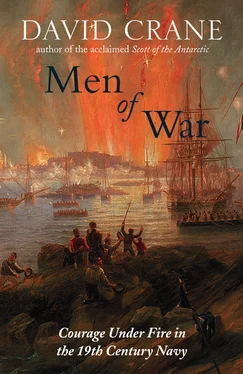The young George Finlay had made an even stronger impression on Byron – he thought the ghost of Shelley had walked in when he first met him – and over the next four years he was to become Hastings’s closest friend and ally in Greece. The following day the two men went to ‘visit the antiquities’ together, but it is a fairly safe bet that if Hastings had his way the conversation was all tactics, hot shot and the ‘one or two Steam vessels’ with which he had promised Byron he could destroy ‘even Constantinople’.
It was a tragedy that it would take Byron’s death in April 1824, and the subsequent wash of sympathy it caused, to realise Hastings’s vision, but even with the arrival of the first £40,000 of the loan he was still made to wait. ‘During the summer of 1824,’ Finlay wrote,
Hastings endeavoured to impress the necessity of rendering the national cause not entirely dependent on the disorderly and tumultuous merchant marine, which it was compelled to hire at an exorbitant price. It is needless to record all the difficulties and opposition he met with from a Government consisting in part of ship owners, eager to obtain a share of the loan as hire for their ships. The loan, however, appeared inexhaustible; and in the autumn of 1824, Hastings returned to England, with a promise that the Greek government would lose no time in instructing their deputies in London to procure a steam-vessel to be armed under his inspection, and of which he was promised the command.
It had taken more than two years for Hastings to get the promise of his steamship. It was just as well that he did not know, as he disembarked in England at the end of 1824, that it would be another two before he would have the chance to fight in her.
IX
If Hastings knew the Greek government too well to imagine that his problems were over, even his cynicism can have done little to prepare him for the vexations ahead. He had sailed back to England in the company of Edward Blaquiere, and within days had exchanged the open corruption of Greece for the more impenetrable mire of Blaquiere’s philhellene friends, the brazen robbery and violence of sectarian fighting for a financial world in which it is now almost impossible to define where greed shaded into outright criminality and incompetence into deliberate malpractice.
The sordid history of the English loan concerns Hastings only in so far as it affected the construction of the new Greek fleet, and all that needs stressing here is that of the £2,800,000 raised from British investors only a tiny fraction was ever converted into the arms or munitions that might have helped win the war. Hastings had himself promised £5,000 to the construction of a steam vessel, but even with that carrot dangling in front of them it was not until March 1825 that the Greek deputies finally authorised the construction of a ship on the Thames at Deptford and of an engine for her to be built by a man who would come to figure large in Hastings’s pantheon of criminal incompetents, the Smithfield engineer Alexander Galloway.
The commission came just in the nick of time – a month earlier, and Hastings had been resolving ‘neither to be a dupe or dupeur’, a month later and he would probably have been back in the Royal Navy – but he knew himself too well to pretend he was done with Greece. ‘I came to town at the instigation of my relations & Naval friends to endeavour to get re-established in the British Navy,’ he wrote soon after getting the invitation to command the steamship.
My brother had seen Lord Melville over the subject & there seems little difficulty attending it …
There is nothing I am aware of that would give me such sincere satisfaction as to aid the delivery of Greece & there never was perhaps an opportunity that offered itself of gaining such lasting renown at so little hazard – I mean there never was an exploit to which such credit was attached so easy of execution as the destruction of the Turkish fleet: & could I feel satisfied that the proper measures would be pursued for attaining that end I would not hesitate an instant to resign my commission was I even Admiral in the British Navy for the purpose of carrying those plans into execution. [If they accept his plan] I shall be that instant ready to renounce the British service & lay down at your disposal the sum of money I had proposed to the Greek Government.
And for any non-establishment naval man, let alone philhellene, there was one further inducement to fight for Greece when her government appointed Thomas Cochrane, the 10th Earl of Dundonald, to command her new fleet. If it had done nothing else the appointment would have signalled the final shift from a military to a naval strategy that Hastings had long been advocating, but it was above all the name of Cochrane – the most brilliant and controversial of the young sea captains to make their reputations during the French wars – that would most vividly have caught the imagination of a born warrior and innovator like Hastings.
On an infinitely grander and more flamboyant scale, Cochrane’s background, character, politics, cussedness, originality and naval career bear striking parallels to Hastings’s own. The tall, red-headed, angular-featured son of an impoverished and eccentric Scottish earl, Cochrane had fought from the outbreak of the French wars, winning himself a reputation for brilliance and insubordination in just about equal measure until a stock market scandal gave his political and professional enemies the excuse they needed to have him drummed out of the service, ceremonially stripped of his knighthood in a midnight ritual of degradation, and thrown into prison.
There seems every possibility that Cochrane was in some way involved in the swindle that brought him down; but, supremely litigious and stubborn by nature, he fought to establish his innocence with the same dogged ferocity that characterised his seamanship. He would have to wait for another generation and a different England to regain his domestic honours, but by the time his and Hastings’s paths crossed he had already made a second and even more glittering reputation in South America’s liberation wars, in command of the nascent Chilean fleet against the Spaniards and then of the Brazilian ships in that country’s struggle for independence from Portugal.
The only drawback to Cochrane, in fact, was that for all the grandiose titles that came his way – Vice-Admiral of Chile, Commander-in-Chief of the Naval Forces of the Republic, First Admiral of the Brazils and Marquess of Maranham – he had never commanded anything that remotely resembled a fleet. The novels of Frederick Marryat are evidence enough of his ability to inspire the men under his immediate command, but Cochrane’s virtues – audacity, ingenuity, courage, unorthodoxy, seamanship, individual flair (and no one ever had them in greater measure) – were supremely those of the frigate captain rather than admiral, the lone ‘sea wolf’ rather than the politician needed to navigate the notorious shallows of Greek naval life.
Given his impeccable radicalism, however, and his extraordinary record in South America – with just a couple of ships and a limitless supply of bluff he had achieved near-miracles – he was an inevitable choice, and if he did not come cheap no one in the summer of 1825 with any imagination could have regarded the £57,000 Greece paid him as anything but well spent. It might give some indication of the scale of this investment if it is remembered that the Greek national revenues for the same year were only £90,000, yet for that £57,000 they were getting the one man who, if past exploits were anything to go by, could deliver on even the wildest and most ambitious of the strategic promises Hastings had made in his letters to Lord Byron.
The detailed and complete destruction of the whole Turkish fleet, the liberation of Greece, the burning of Constantinople itself – Cochrane instinctively saw the same possibilities that Hastings did and, more importantly, the same methods to achieve them. ‘I have not been able to convince myself that, under existing circumstances, there is any means by which Greece can be saved as by a steady perseverance in equipping the steam vessels,’ Cochrane wrote to the Greek deputies, warning them that he would not budge until he had six steamships armed with Hastings’s sixty-eight-pound long guns under his command,
Читать дальше











